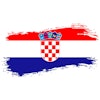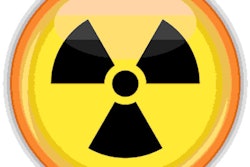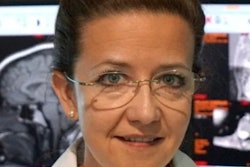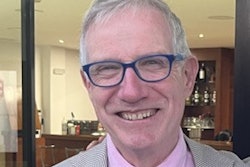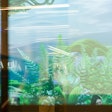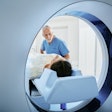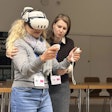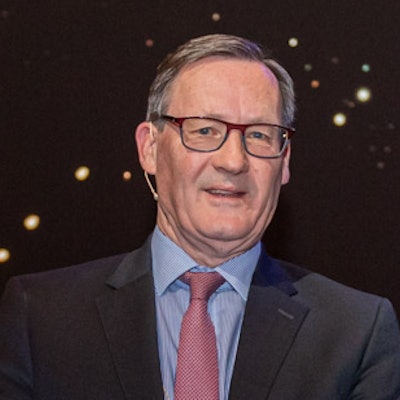
Radiologists must not be afraid to branch out into broader health management roles and advocate the value of radiology within the system at large. That's the view of Prof. Risteárd Ó Laoide.
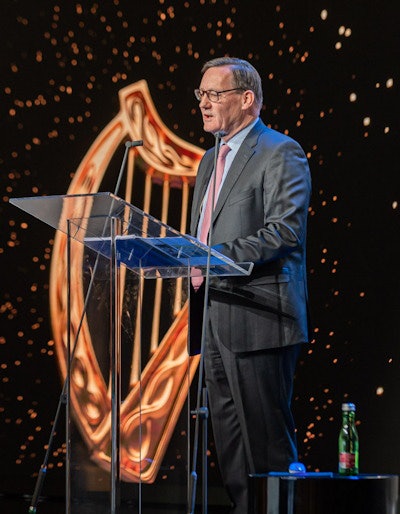 Prof. Risteárd Ó Laoide. All images courtesy of Sebastian Kreuzberger/European Society of Radiology (ESR).
Prof. Risteárd Ó Laoide. All images courtesy of Sebastian Kreuzberger/European Society of Radiology (ESR).Ó Laoide was appointed head of the National Cancer Control Programme (NCCP) of Ireland in August 2020. The NCCP is a directorate within the Health Service Executive (HSE) that manages and organizes cancer control measures on a whole population basis. Ó Laoide was previously joint group clinical director at Ireland East Hospital Group (IEHG) and consultant radiologist at St Vincent's University Hospital, Dublin.
The NCCP role has allowed Ó Laoide to learn from stakeholders, including patients, advocacy groups, hospitals, and government departments to develop solutions. The "gained awareness of unmet needs" has helped him contribute to a wider vision for healthcare in Ireland, he told ECR 2023 attendees in a plenary lecture.
Ó Laoide stressed the importance of empowering high-quality local care, ensuring critical mass and expertise for complex procedures, networking to share the acquired knowledge, and setting quality work as a top priority.
From dark room to dark side
When he took his first steps in radiology around 35 years ago, he was navigating through the still analog darkroom, along with professional and personal colleague ESR President Prof. Adrian Brady of Mercy University Hospital in Cork.
In his ECR plenary, Ó Laoide speculated about whether his career trajectory of recent years would mean he would have to "join the dark side" and whether balancing medical practice with management responsibilities would require him to develop "a certain duality in personality." These roles may seem quite different in nature, but "with the evolution of health care, the differences between darkroom and dark side are getting smaller," he said.
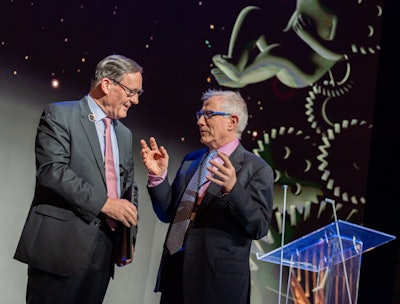 Ó Laoide enjoys a conversation with Prof. Adrian Brady during ECR 2023.
Ó Laoide enjoys a conversation with Prof. Adrian Brady during ECR 2023.Ó Laoide, a former executive director of the Cancer Clinical Academic Directorate at IEHG, listed essential career qualities today as adaptability, particularly within a rapidly evolving field like radiology. Other attributes are detail-oriented ability to synthesize complex information quickly, good communication skills, and a strong team ethic -- plus "confidence, with the humility to admit to mistakes, and not to dwell on them," he told ECR delegates.
Although not everyone within the wider healthcare system regard radiology as particularly important, Ó Laoide sees the field to be "central to high quality care."
"It's an 80/20 secondment, so it allows 80% for my role as National Director and 20% for a clinical role," he said, noting that the NCCP post is for a specific time period of five years.
Lessons of cyberattack
A few months into the job, Ó Laoide became involved in the fallout from the devastating cyberattack in May 2021 on the Irish healthcare system. It made everybody realize just how critical strong leadership and teamwork are to ensure patient safety, he told AuntMinnieEurope.com after his lecture.
The attack "required everyone in the entire health care system to work really well together, to bring services back safely, particularly in radiation oncology," Ó Laoide commented.
He said he was proud about how efficiently his colleagues handled the emergency. "It happened on a Friday, they worked over the weekend, and started treating radiotherapy patients again on Monday morning," he recalled.

